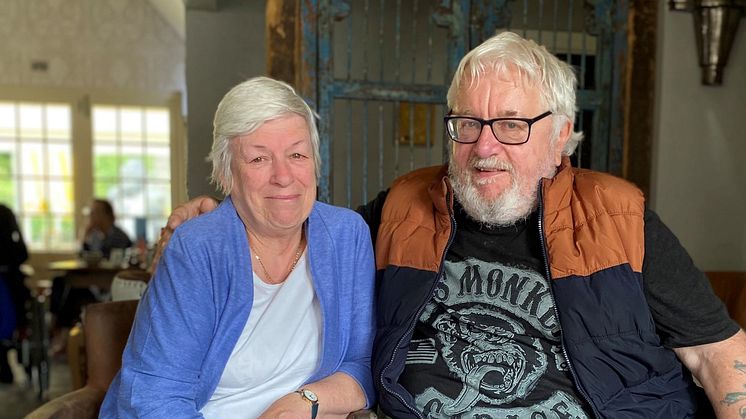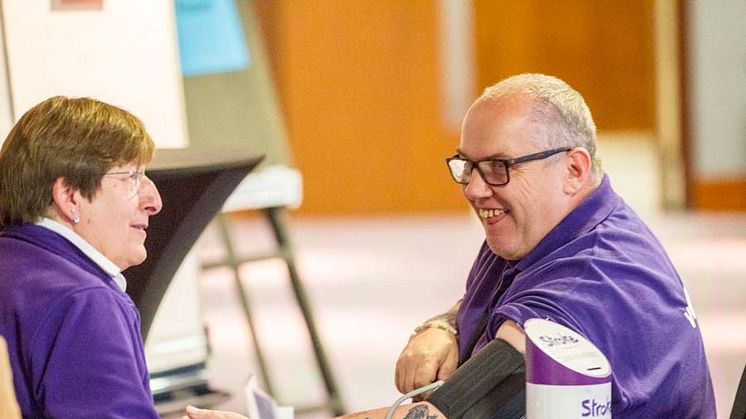
Press release -
Aylesbury stroke survivor who struggles to speak wants more awareness of aphasia
An Aylesbury man whose stroke left him without the ability to communicate properly is backing a charity’s plea for people to be more aware of the condition.
Retired motor mechanic Richard Puddiphatt has aphasia, one of the lesser-known effects of stroke which affects a person’s ability to speak, read, write and use numbers, but it does not affect intellect.
Richard, 67, who had a stroke at home three years ago, has had to devise new ways of making himself understood as he struggles to get words out.
He is sharing his story to mark Aphasia Awareness Month and to encourage stroke survivors living with aphasia to use the information and support that’s available from the Stroke Association.
Richard’s wife Linda, 71, said he had worked tremendously hard to rebuild his life after the stroke which happened in the early hours of the morning.
“I noticed that Richard was very fidgety when we went to bed,” said Linda. “At 2.30am he fell out of bed and I couldn’t lift him. I noticed that his mouth had gone down on the right side.
“I called an ambulance and he was taken to intensive care at Wycombe Hospital and later transferred to Amersham Hospital for rehab. He had nine weeks in hospital in total.
“He had real difficulty walking but he was determined to walk again and had to show he could walk upstairs to bed before he could come home.
“Because of the aphasia his words weren’t joined. If he wants to explain something he’ll do an action, such as a plane or a train. He had to learn to write with his left hand.
“You’ve got to listen to him carefully. When he meets someone he’ll explain that he’s had a brain injury and put his hand on his head.
“He has a card which he hands to people. It says ‘I’ve got aphasia, please speak slowly’. We live in a tough old world but most people we meet understand him. He used to get embarrassed but he’s not more.
“He just gets very frustrated when he can’t get his words out. He’s a good man and he’s worked hard all his life.
“He gets frustrated sometimes. We went into a pub not long ago and we told the man behind the bar and he gave Richard a piece of paper so he could write the order down. The main thing is not to be embarrassed about it. He’s very lucky, he could have been a cabbage.
“He forgets people’s name and he calls everyone Dave but they understand this.”
Richard attends a number of stroke groups meeting other stroke survivors and Linda, a retired care home worker, says that this has given him a new confidence.
“I just think thank God for the stroke clubs. He would be lost without them. He’s proud of going to the stroke clubs because he’s quite a shy person but he enjoys helping people new people who join.
“Richard’s personality has changed. He’s grateful to be alive. He’s had a second chance. It’s given him more confidence.
“It is a testing time for your marriage when someone has stroke. I say to him don’t worry, things will be alright. Life is very precious. You don’t know what’s around the corner.
“Just keep plodding on and if you can’t get the words out write them down. It’s nothing to be ashamed off.”
Juliet Bouverie, Chief Executive of the Stroke Association said: “Aphasia is incredibly common after stroke, affecting one in three stroke survivors.
“It robs you of the ability to talk to loved ones, to do everyday tasks such as go shopping, use public services or get online - things we all take for granted.
“But there is hope and the brain can recover and adapt. Stroke survivors with aphasia can make improvements as well as developing alternative ways of communicating. Get in touch with the Stroke Association to find out how we can help.
“We’re here to support people with aphasia to rebuild their lives and to regain their confidence and independence. Our “Getting Online for People with Aphasia” guide equips you with the skills you need to get online, keep in touch with family and friends and to connect with the stroke community. Support is also available through our stroke support groups, My Stroke Guide and communication support service.
“It’s also incredibly important for the public to be aware of what aphasia is, the things to look out for and to learn strategies that might help those with aphasia living in their community. We all have a part to play in adapting our communication to be inclusive for all.”
If you or someone you know is living with aphasia, visit stroke.org.uk/aphasia for information and support.
The ‘Getting Online for People with Aphasia’ guide is available at: www.stroke.org.uk/aphasiaonlin...
My Stroke Guide is available at: https://www.stroke.org.uk/finding-support/my-stroke-guide
Topics
Categories
- Stroke strikes every five minutes in the UK and it changes lives in an instant.
- The Stroke Association is a charity working across the UK to support people to rebuild their lives after stroke. We believe that everyone deserves to live the best life they can after stroke. From local support services and groups, to online information and support, anyone affected by stroke can visit stroke.org.uk or call our dedicated Stroke Helpline on 0303 3033 100 to find out about support available locally.
- Our specialist support, research and campaigning are only possible with the courage and determination of the stroke community and the generosity of our supporters. With more donations and support, we can help rebuild even more lives.
- You can follow us on Twitter, Facebook and Instagram.


